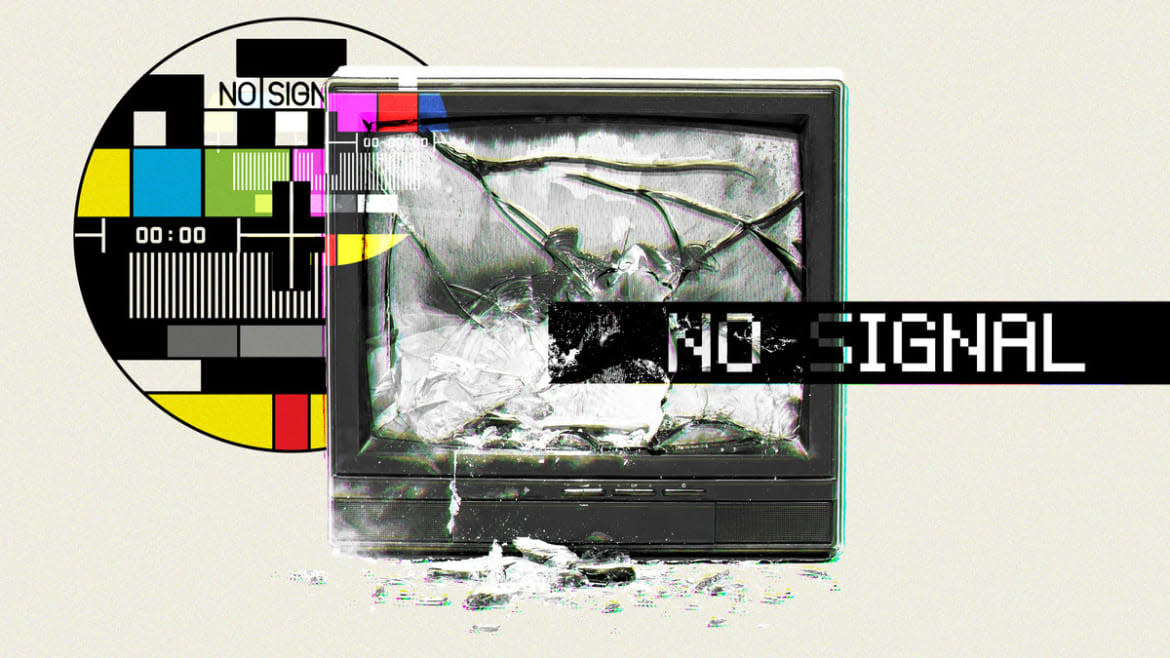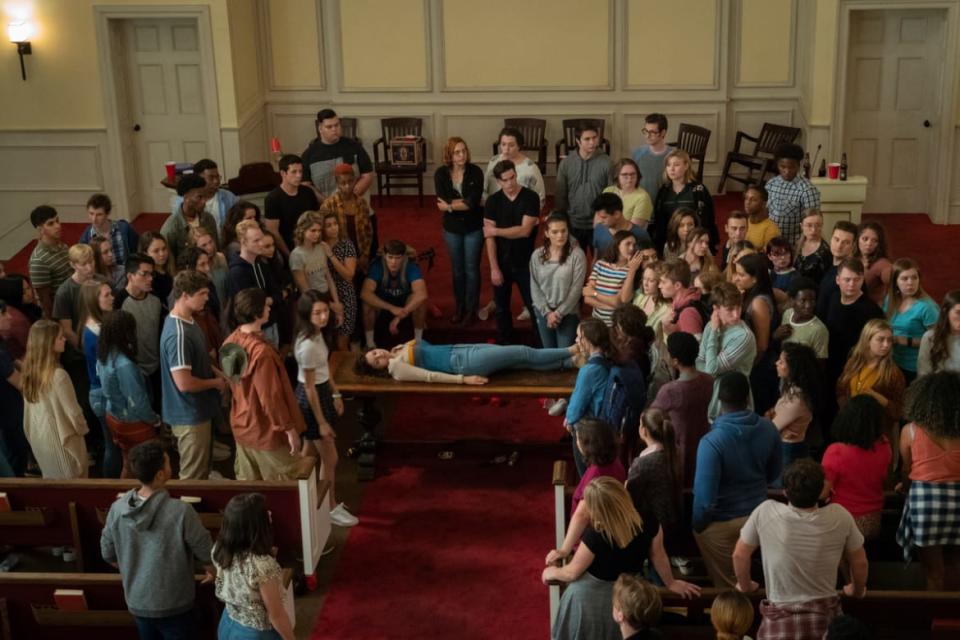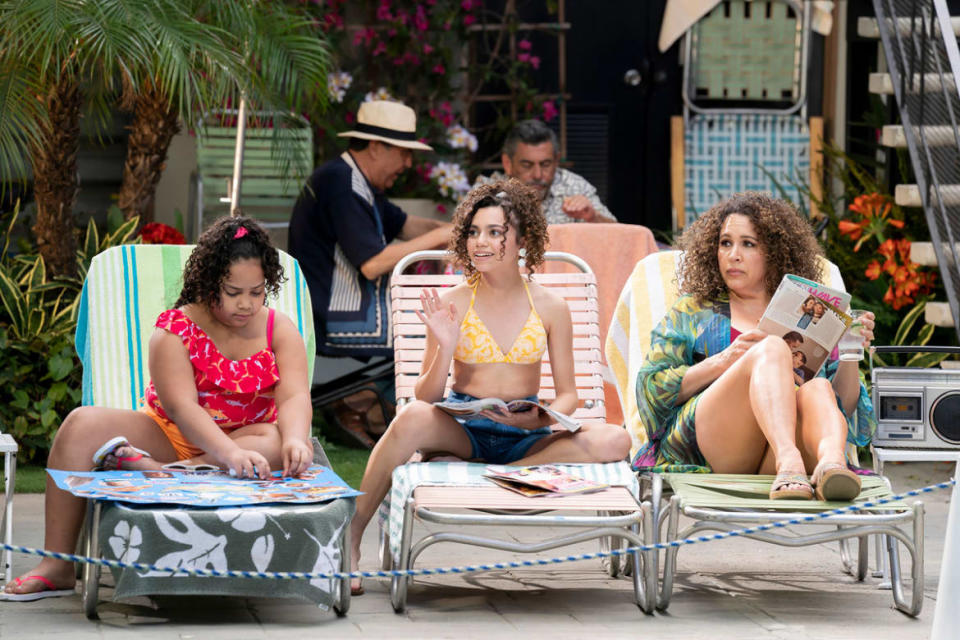What It’s Like to Have Your TV Show Unceremoniously Canceled

“It’s a little bit of a breaking of trust with the audience,” says Christopher Keyser from his hotel room in Paris where he was shooting the second season of Julia earlier this year. He says that the current business model for networks and streamers is to throw “a thousand shows at you so you’ll forget and move on. And I think that’s a complicated way of developing a relationship with an audience.”
One show Keyser and I haven’t forgotten about is his short-lived speculative Netflix show, 2019’s The Society.
For those of you who might have missed it prior to its late 2020 cancelation, just days before season two was set to begin shooting amidst staunch pandemic protocols: The Society follows a group of teenagers who return from an ill-fated field trip and discover that they’re the only ones left in their town. (Thus, they form their own society.) It was an interesting look at politics, environmentalism and the future of humanity that I still think about constantly, especially as Season 1 finished on a cliffhanger that showed the remainder of the town living on in another timeline or dimension in which the teens were the ones who disappeared.
Keyser, who is perhaps best known for the original Party of Five and its reboot, was just as upset about The Society’s cancellation as I was. Especially in the recent streaming age, when series seem to get the axe at random times, stunning fans and leaving them with no satisfying narrative conclusion, I started to wonder what we lose culturally when this happens.

“Almost all shows live with the possibility that they’re going to be canceled before the showrunner or the fans want them to,” he said. “[But] if [no one has] told me I’m canceled, I’m not canceling my show myself by writing a storyline that leads me to a dead end. We’re always a little bit at risk of that.”
Conversely, Brigitte Muñoz-Leibowitz, showrunner of this years’ Gordita Chronicles on HBO Max, believes the threat of cancellation forces showrunners to tell a complete story in one season. Or the much-maligned “10-hour movie” model of television. Her show was one of the victims of Warner Bros’s merger with Discovery.
“It’s fine when a show has a natural stopping point, and sometimes that is three seasons and a lot of creators are beginning to understand and embrace that,” she told me via Zoom. “The trend right now, or what’s becoming the stylistic trend, is these kinds of serialized narratives. They’re movies basically, and they have controlled arcs for characters over a set period of time. When you stop them in the middle you’re saying your story doesn’t matter.”
This HBO Max Drama Is a Big, Depressing Mess
Anyone who’s paid attention to the spate of cancellations in recent years, which really picked up during the pandemic and has continued since, will notice that many of the casualties of this phenomenon are “diverse” shows, such as Gordita Chronicles, Diary of a Future President, and the patron saint of shows that ended too soon (and much to fans’ passionate chagrin), One Day at a Time—all of which Muñoz-Leibowitz has worked on. (“I swear it’s not me!” she laughs.)
“We’re telling storytellers that they don’t matter. We’re telling the audience that they don’t matter. We’re prioritizing profit over product and quality, and the whole reason any of us make art to begin with. It’s the ultimate disrespect,” she says.
Muñoz-Leibowitz’s colleague on Diary of a Future President, showrunner Ilana Peña, agrees.

“I think the Golden Age of Television—whether we’re still in it or what[ever] we would call this era—is amazing because the volume of shows has been so high. I feel so grateful that as a younger, female, Latina creator I got to run my show, be the sole creator, and have opportunities because there was a boom of shows being made.
“However, because there’s so many shows, you don’t get the seven seasons of Gilmore Girls; you don’t get however many seasons of The O.C.,” she continues. “But you’re getting more underrepresented voices telling the stories. It would be so great to have the diversity of voices and the longevity of stories because the diversity of voices have different stories to tell and different points of view. We’ve seen the 10 seasons of the dominant culture stories. We grew up with those. We love those! But now let’s give other people with different backgrounds the chance to also have that luxury.”
By the same token, she hates being lumped in with other “diverse” shows that tokenize identity as a genre tag.
New on Netflix December 2022: ‘Scrooge,’ ‘Pinocchio,’ and More
“This industry requires you to put it in front of [your] show... [Diary of a Future President is] not a genre [show]! I don’t wake up in the morning and think, time to live my Latinx life! It’s my life!” she exclaims.
When I was reporting this article, I didn’t set out to only interview showrunners of the adolescent category of TV shows. But it’s telling that they were the ones willing to talk to me about what is lost culturally when the stories they invest in and that reflect them are discarded.
“People watch television because they see themselves in the characters,” Muñoz-Leibowitz says. “They watch it more and more as a form of therapy, to see how people handle things in their lives, to watch stories of empowerment. When the rug is pulled out from under them and the trapdoor opens, not to over-hype this point, but it is traumatic. For some people, especially during COVID, TV is the one thing that they have and it’s like losing a friend. Especially if you really connected to the material, it can be really invalidating to see something that you love and care about be valueless in a corporation’s eyes.”
Remembering ‘FBoy Island,’ the Best Reality Dating Show of Our Time
Peña is optimistic, though, talking up the fan-fiction that has emerged out of the Diary of a Future President fandom and the major projects some of her cast have gone on to do, such as Charlie Bushnell, who will be starring in the upcoming Percy Jackson and the Olympians.. These successes might, in turn, bring new eyes to the existing two seasons of Diary of a Future President on Disney+, although no such luck for Gordita Chronicles, which was being shopped around to other outlets to no avail. This week, it succumbed to the troubling trend of streamers pulling shows from their platforms entirely.
While some fans wait optimistically to see if they will ever get a revival of any of these series, the creative teams have tried to find closure in different ways, such as the graphic novel that will form the conclusion to The Society.
“There’s no accounting for taste, but the issue I see is that when you’re a company that says we have a taste for everybody, just not you guys, that’s what’s messed up,” she says. “It’s hard not to see their choices of programming moving forward being choices that don’t serve my communities.”
Complicating things and making something as emotional as a cancellation all the more confusing is, as Muñoz-Leibowitz brings up, streamers’ well-publicized aversion to providing creators with ratings.

“Our residuals as writers, directors and actors are directly linked to the number of times people watch things,” she says. “If they can control and do the accounting on our end and never show us the receipts, it’s impossible for us to pursue any corrections or disputes with them.”
And guess who that mostly affects? Largely young, non-white and female first-time showrunners such as Muñoz-Leibowitz and Peña.
Both believe that having diversity at the top executive levels will mitigate some of the carnage.
“When you have people at the top whose voices haven’t always been included, they usually tend to hire people whose voices haven’t always been included in casting, in the writer’s room, in the crew, in production,” says Peña, while Muñoz-Liebowitz ponders whether she’ll pivot to the business side of things. “But that sounds miserable!” she says. “They work so hard and are so underappreciated.”
After more than 30 years in the industry, Keyser tries to strike a balance between being upset about The Society being canceled (“I wish it hadn’t been!”) and having enough experience to understand that it’s the nature of the beast.
“The business of making television is wonderful and heartbreaking; back and forth! If you’re lucky to get more wonderful and less heartbreaking. You’re unlikely to avoid heartbreak, and audiences are the same: they invest, and then that investment is taken from them periodically, and sometimes it’s fulfilled. The world of television—watching and making [it]—is made up of all of those things. There’s got to be a balance of enough good things that’s gonna keep people watching.”
Get the Daily Beast's biggest scoops and scandals delivered right to your inbox. Sign up now.
Stay informed and gain unlimited access to the Daily Beast's unmatched reporting. Subscribe now.

 Yahoo Movies
Yahoo Movies 
